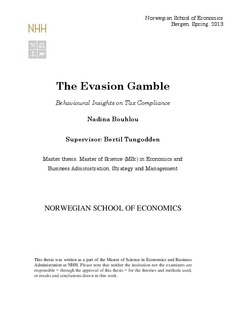| dc.description.abstract | The thesis explores the insights from behavioural economic research for
tax compliance. The theoretical model of tax evasion by Allingham and
Sandmo (1972) is reviewed and then enriched with findings from research
on bounded rationality and unbounded motivation for human behaviour.
In specific implications for tax compliance of loss aversion,
overweighting of low probabilities, small sample bias and procrastination
are discussed. It is suggested that the perception of probabilities and the
tendency to procrastinate affect the decision on whether or not to comply
taxes. Further, implications for tax compliance of moral motivation,
conditional cooperation and the threat of intrinsic motivation being
crowded out are discussed. The act of complying, even when the risk of
getting caught is low, indicate that people do not behave entirely selfinterested.
To explore the evasion decision further, and look in depth at some of
the phenomena discussed, a survey-experiment is conducted. The objective
is to study whether peoples’ tendency to overweigh low probabilities and
their propensity to confirm to social norms affect their willingness to
consider hiring black labour. The results from the experiment are reported
at the end of the thesis. The main finding is that people overweigh low
probabilities and that it affects their decision on considering hiring black
labour. | no_NO |
